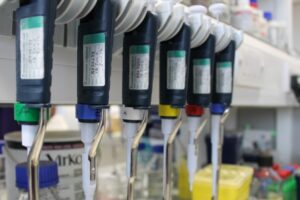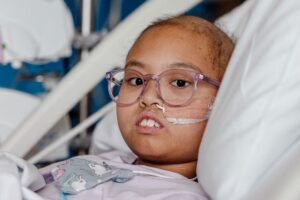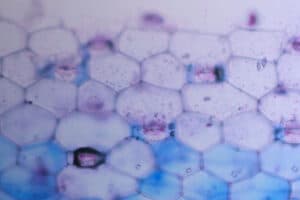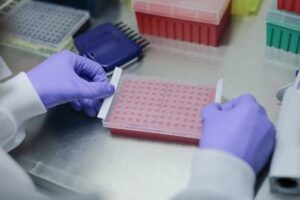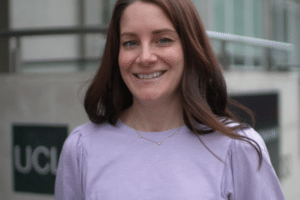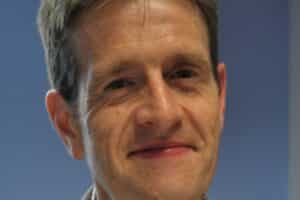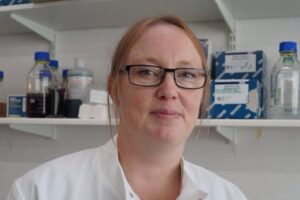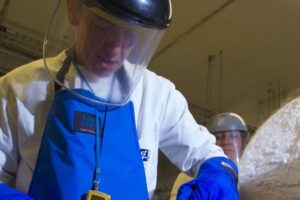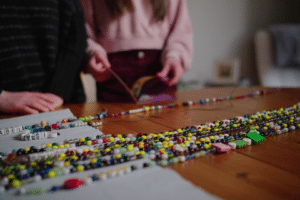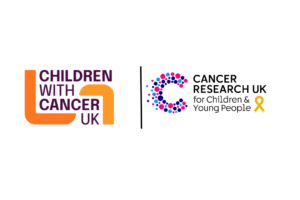Q&A: Prof. Catherine Metayer on studying the relationship between folate and leukaemia risk.
Find out more about Professor Catherine Metayer project, which focuses on investigating the relationship between folate and leukaemia risk. Her research could lead to new ways to identify children at risk, and prevent them from developing this cancer.
We spoke to Professor Catherine Metayer, working on the relationship between folate and leukaemia risk.
Q: How and why did you become a researcher?
A: I was always interested in biology and medicine as a young person and went to medical school in Bordeaux, France. During my training as a fellow, I treated patients with cancer and got attracted by the complexity of the disease and wanted to better understand the biology and roots of cancer. Plus, I have a bachelor in mathematics and I have always liked “numbers”, so becoming a cancer epidemiologist felt natural.
Q: You are working on research into genetic biomarkers in childhood leukaemia, what made you choose that as a project?
A: Rates of childhood leukaemia have increased over the past decades, which means that something in the way people (here parents and children) live/work/play/eat/breath/etc must contribute to this increase to some extent. But the questions are what, how, and when? And, is your environment/lifestyle/diet acting solely or are some people more susceptible than other? For this project we focused on folate because it is essential to DNA synthesis and integrity, and because pooled analyses that I led with studies from the Childhood Cancer and Leukaemia International Consortium (CLIC) showed that prenatal folate and vitamin supplementation reduces the risk of childhood leukaemia. We then wanted to better understand when folate intake was most efficient in reducing risk, and whether genetic and epigenetic profiles were at play in influencing the childhood leukemic risk. We found that levels of metabolites in the folate pathways that we measured in new born blood samples were not predictive of childhood leukaemia, supporting the beneficial role of folate intake early in pregnancy instead of late pregnancy. Our pooled analysis with original CLIC genetic data on more ~ 2,900 single nucleotide polymorphisms (SNPs) within 46 candidate genes involved in folate metabolism did not reveal associations neither. However, when we examined the relationship of methylation patterns associated with peri-conception folate intake in children with leukaemia vs. controls, our results lend support for the role of folate as a drive of early changes in DNA methylation that affect future development of childhood acute lymphoblastic leukaemia.
Q: What is the hardest part of your job?
A: To be honest the hardest is to find sustainable support to do the research—many researchers like me have a lot of ideas/hypotheses to test to find out who is at elevated risk of cancers but only a few get selected because funding for etiologic studies is sparse, even more so for childhood cancers. I would like to take this opportunity to thank the Children with Cancer UK for funding several of my projects in the past, as well as partially supported the CLIC consortium conferences and infrastructure. The other challenge is to disseminate our findings to various audiences including clinicians, who may not be aware of the large body of work done to better understand what causes leukaemia, and possible ways to prevent it.
Q: What is the most rewarding part?
A: The most rewarding is to work collaboratively with people from different background and expertise around the world, which helps propel the research further. Also, to see a research concept from early development and to full implementation is always rewarding, even if it can take some time.
Q: Ultimately what do you hope your research will lead to?
A: Findings of this project have public health implications to promote folate supplementation early in pregnancy, especially among women with possible baseline folate deficiency to reduce the risk of leukaemia in children. Similar studies should be conducted for other childhood cancers. In general, I hope that my research will increase awareness of what causes childhood leukaemia (like exposure to air pollution, pesticides), as well as what can reduce the risk (like breast feeding, healthy diet). As a trained general practitioner, I always give priority to prevention, and I am carrying this into my research.
Q: Who have you admired in the history of researchers/medicine and why?
A: When I was a teenager, I read a biography about Louis Pasteur and was fascinated about his discoveries, which I think influenced me to go to medical school and then pursue a degree in epidemiology to conduct research.
Q: What advice would you give someone considering research as a career?
A: I would recommend reaching out to mentors at an early stage to be exposed to real-life opportunities to conduct and communicate research and learn skills that are not always taught in classrooms or books.
Q: What advances have you seen in your career as a researcher?
A: A large part of what I do is to characterise past exposures to chemicals to see if and how they predict cancer development. Thel “exposomic” and geographic information system (GIS) technologies have allowed to improve exposure assessment dramatically in the past decades.
Q: What difference will your research hope to make to children and young people with cancer?
A: My hope is to prevent cancer in children and young people whenever possible so that it is crucial to continue etiologic research and support research translation to increase awareness and prevention strategies.
Q: What do you wish that people understood better about research?
A: Research can be complex to carry and to translate, and it takes large teams and often years to complete it. This being said, involving patients early in the research enterprise may help prioritise research topics that are the most important to them and speed up discoveries and translation into actions.
Q: In your opinion, what does the future look like for childhood cancer?
A: While progresses have been made to treat most cancers, the experience is traumatizing, and prognosis is still poor for other cancers. Parents of children affected by cancer are asking for answers to their question: why my child has cancer? It is our responsibility to continue our efforts to identify risk factors and to reduce the risk of developing cancer at a young age at the first place.
Q: You are working hard to increase the survival rates of children…what is your favourite childhood memory?
A: I grew up in France close to nature, and I have fond memories of playing in the forest with my brothers and cousins in the winter and heading to the coast and ocean in the summertime. I was very fortunate to see beautiful places at a young age.
Q: What is the best advice you have ever been given by anyone?
A: Do not take “no” as a “no”!
Q: How do you unwind after a day at work?
A: I live in the San Francisco Bay area in California which gives me plenty of opportunities to walk and hike. I can quickly switch from looking at a computer screen to looking at breath taking views of the water and hills few minutes from home.
Q: Do you have any message for children undergoing cancer treatment at the moment?
A: A lot of people are caring about you to help you get passed this challenging experience—parents, siblings, doctors, caregivers, and more, but ultimately you are the ones to be strong and resilient to see a better future. I know many children have taken the lead to help other children with cancer and raised money to support research to help prevent and cure the disease and help childhood cancer survivors to thrive. This is empowering.
Learn more about Prof. Catherine Metayer research project on the relationship between folate and leukaemia risk.
Other stories
We have lots of information to help you learn more about childhood cancer. From specific cancer types, to treatments and causes.
